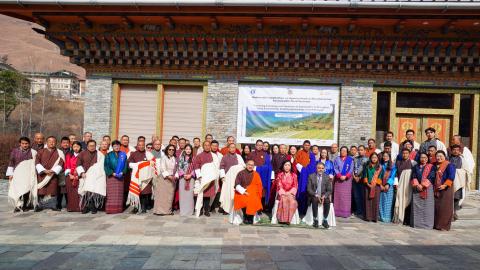In a significant step towards reimagining food systems across the Himalayas, recent national consultations in Nepal and Bhutan are setting the stage for a transformative agroecological future. These initiatives have united key policymakers, experts, and advocates committed to building resilient, sustainable agricultural practices and value chains.
Amidst escalating climate challenges and the growing urgency to safeguard critical natural resources such as soil and water for future generations, the Agroecology Roadmap consultations represent a collaborative effort to secure food sovereignty, by integrating traditional wisdom with modern innovations. This dynamic approach demands scaling up policies that support smallholders keen to step up on sustainable practices, that foster small and medium-sized enterprises to scale food processing and marketing, and that expand local consumption of healthy food, enhancing community resilience across the region.
Bhutan: Empowering Sustainable Futures
In Bhutan, progress has been both rapid and impactful. Two district consultations in Dagana and Chukha, held by the end of 2024, laid the groundwork for a broader national dialogue. These local engagements have sparked renewed energy around sustainable practices and set a clear path for future initiatives.
On February 12, Bhutan hosted a landmark National Consultation on the Agroecology Roadmap that brought together over 60 high-level officials—ranging from ministers and bureaucrats to policymakers and experts. The event was further elevated by the inspiring presence of Queen Mother Ashi Dorji Wangmo Wangchuck, founding president of the Tarayana Foundation, reinforcing the nation’s commitment to achieving food self-sufficiency by 2029.
Building on these discussions, Bhutan’s consultation process is now seen as a catalyst for actionable change. The high-level dialogue is expected to translate into concrete policies that blend traditional agricultural practices with innovative sustainability measures, an improved food system governance in the country and an increased alignment policies across agriculture, trade, health, and environment sectors, ultimately creating a robust framework for a secure and balanced food system.
- Bhutan targets food self-sufficiency by 2029 - BBSCL: https://www.bbs.bt/224607/
Nepal: Cultivating Resilient Agriculture
Nepal’s journey toward a sustainable food future has been marked by a series of strategic consultations. Two provincial dialogues in Karnali and Gandaki paved the way for a comprehensive discussion at the national level, underscoring the country’s commitment to innovative and climate-resilient farming, agroecological value chains and consumption of nutritious food.
The second National Consultation Workshop on the Agroecology Roadmap, held on February 7 and chaired by Dr. Ram Krishna Shrestha of the Ministry of Agriculture and Livestock Development, brought together a diverse group of stakeholders. Government officials, university professors, researchers, and agroecology advocates united to explore practical solutions that bridge research and policy.
This collaborative effort in Nepal not only reinforces the country’s dedication to sustainable agriculture, but also highlights the importance of knowledge exchange, stakeholder engagement and evidence-based policymaking. By integrating local expertise with forward-thinking strategies, Nepal is cultivating a pathway that promises to transform its food systems for a greener, more resilient future.
Inspiring Regional Collaboration
Both Bhutan and Nepal are demonstrating that regional cooperation and shared visions can drive significant progress in sustainable agriculture. The consultations have ignited a spirit of innovation and partnership that is essential for tackling the multifaceted challenges of food security and environmental resilience in the Himalayas.
As these initiatives progress, stakeholders from both countries are eagerly anticipating the next steps—further development of the roadmap texts and continued dialogue that will refine and expand these pioneering strategies. The consultations not only celebrate current achievements but also lay a robust foundation for future policy enhancements and collaborative work.
Both, the World Future Council and IFOAM – Organics International, are constantly supporting these critical milestones and are committed to assist stakeholders in strengthening sustainable food systems across the Himalayan region. This collaborative journey is set to inspire communities and leaders alike, driving forward resilience and ecological balance, since never before the time to act has been so urgent.
More about the Himalayan Agroecology Initiative








